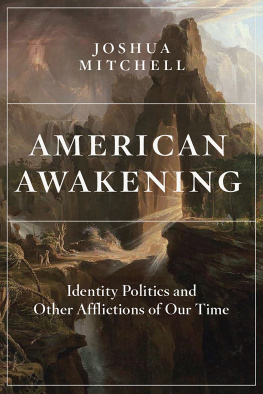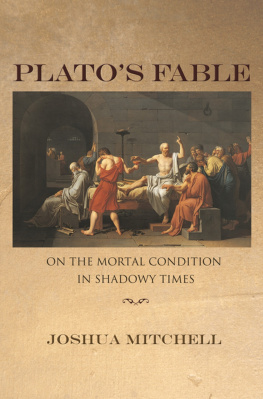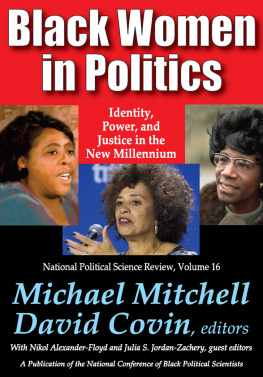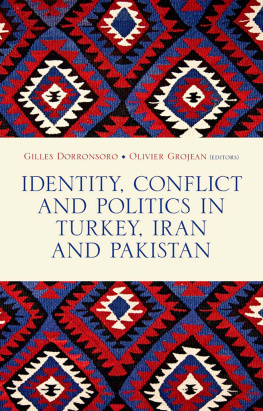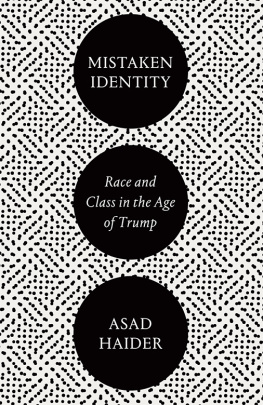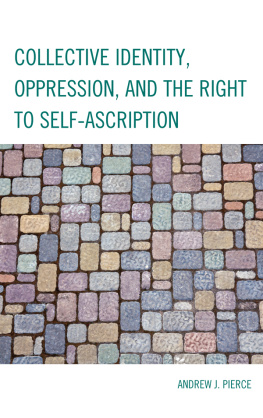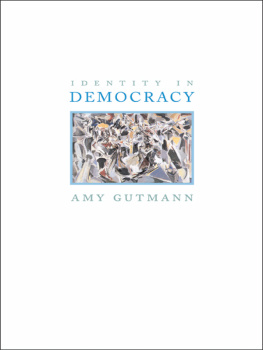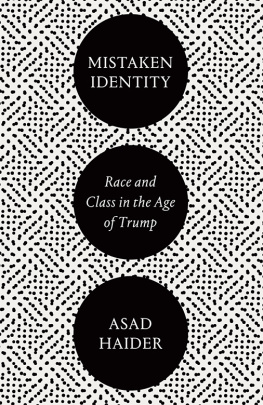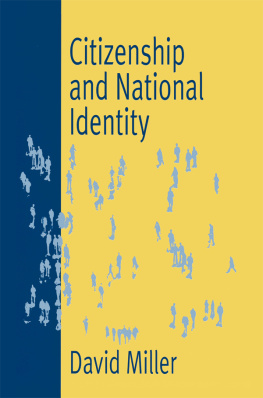
PRAISE FOR
American Awakening
American Awakening is essential reading. Joshua Mitchell exposes the spiritual disorders that are paralyzing public life. An ersatz politics of innocence has replaced our liberal politics of competence.
R. R. RENO,
editor of First Things
At lasta sophisticated and articulate theological/philosophical/political critique of the intellectual incoherence, bad faith, and internal contradictions that mark todays identity politics. Its appropriation of a religious rhetoric of transgression and innocence makes a civil politics of liberal competence impossible. Allied to a new and schizophrenic world of national administrative elites, global economic managers, and isolated selfie individuals, the future of American democratic social and political life is at stake.
ELDON J. EISENACH, professor emeritus of political science,
the University of Tulsa, author of Sacred Discourse and American Nationality
There is no more trenchant analyst of postmodern democracy and its discontents than Joshua Mitchell. This courageously argued manifesto is spring water in the desert of an American politics reduced to fusillades of sound-bitten and tweeted idiocy. Read it and be chastened. Read it and find hope.
GEORGE WEIGEL, distinguished senior fellow and William E.
Simon Chair in Catholic Studies, Ethics and Public Policy Center
If you, like so many others, are bewildered by what is taking place in our streets today, American Awakening is for you. It will provide you with the tool kit needed to sift through the wreckage. It will also be good for your soul.
MIKE GONZALEZ, Angeles T. Arredondo
E Pluribus Unum Fellow at the Heritage Foundation
and author of The Plot to Change America
From identity politics and the Alt-Right to the opioid crisis and coronavirus lockdown, Joshua Mitchell is the master diagnostician of the philosophical and spiritual errors behind our countrys critical condition. And best of all, he shows us how to correct them.
DANIEL MCCARTHY, editor of
Modern Age: A Conservative Review
American Awakening is a tour de force: it is the deepest and yet the most accessible analysis of the political and intellectual movement which may yet undermine our civilization, identity politics. Mitchell has a capacious and original mind, and his book is an unmatched resource for understanding our confused and confusing times.
ARTHUR MILIKH, executive director, Center for the
American Way of Life, the Claremont Institute
AMERICAN AWAKENING
ALSO BY
JOSHUA MITCHELL
The Fragility of Freedom: Tocqueville on Religion,
Democracy, and the American Future
Platos Fable: On the Mortal Condition in Shadowy Times
Tocqueville in Arabia: Dilemmas in a Democratic Age
JOSHUA MITCHELL
AMERICAN AWAKENING
Identity Politics and
Other Afflictions of Our Time


2020 by Joshua Mitchell
All rights reserved. No part of this publication may be reproduced, stored in a retrieval system, or transmitted, in any form or by any means, electronic, mechanical, photocopying, recording, or otherwise, without the prior written permission of Encounter Books, 900 Broadway, Suite 601, New York, New York, 10003.
First American edition published in 2020 by Encounter Books, an activity of Encounter for Culture and Education, Inc., a nonprofit, tax-exempt corporation.
Encounter Books website address: www.encounterbooks.com.
Manufactured in the United States and printed on acid-free paper. The paper used in this publication meets the minimum requirements of ANSI/NISO Z39.481992 (R 1997) (Permanence of Paper).
FIRST AMERICAN EDITION
LIBRARY OF CONGRESS CATALOGING-IN-PUBLICATION DATA
LC record available at https://lccn.loc.gov/2020008204.
LC ebook record available at https://lccn.loc.gov/2020008205.
For Reagan Alice and Harper Hope,
the first two of the next generation
Table of Contents
Preface
If humanism were right in declaring that man is born to be happy, he would not be born to die. Since his body is doomed to die, his task on earth evidently must be of a more spiritual nature.
1. This book is about three separable but ultimately related ailments from which we suffer immensely in America today: identity politics, bipolarity, and addiction. Should these three ailments be gathered together in one book? I think they should be, because although identity politics is the more immediate threat, our republic cannot be healthy if we do not also understand and address bipolarity and addiction. The latter two are generally treated as behind-the-scenes psychological or physiological problems about which only trained experts are authorized to write. I have no such authorization. I write as a political philosopher, attentive to what the great authors of the West have written about the human condition; and I write as an observer of, and in, our times. Because of my training, I will consider both bipolarity and addiction in an unorthodox, and I hope, more capacious way than our psychologists and medical experts generally allow. I will look at bipolarity and addiction as existential, political, social, and theological issues that the pharmacology recommended by experts cannot cure. All this, in due course. First, I will make a few observations about identity politics, to give some sense of its contours and of the danger that it poses. Unlike bipolarity and addiction, which seem to belong to our quiet private affairs, identity politics is a very loud public affair. Moreover, it is a loud public affair that is making constructive public life increasingly difficult if not impossible. That is why more than half of American Awakening is concerned with this affliction. To wrestle with the quiet, seemingly private problems we face, we must first take care of the loud public problem. To start our longer journey to recovery, let us start with what is right in front of our nose.
2. By so many measures, life is getting better all the time. There have been no global wars in the last seven decades. Standards of living have increased nearly everywhere, well beyond anything imaginable at the end of World War II. Many diseases have been eradicated. Starvation is rarer. Drinking water is more readily available. Housing stock has multiplied and modern conveniences have grown exponentially. Travel by every means is safer. International communication is instantaneous and inexpensive. The computing power of a common smartphone exceeds the computing power the astronauts of Apollo 11 had at their disposal during the first manned landing on the moon in 1969.
3. Alongside the visible material economy that has made these improvements possible lies another economy that is also concerned with weighing and measuring. In this economy, however, we do not weigh and measure empirical things like money, time, and materials. Rather, we seek to measure transgression and innocencesometimes with a view to the mystery that no balance of payment between them is possible, and sometimes with a view to the demand that all accounts be settled. I will say more about both of these views in a moment. For now, I will say that this invisible economy is uncorrelated with the economic advances we make and, therefore, with the happiness and well-being that is supposed to be ours. Strangely enough, this invisible economy also seems to obtrude all the more as our standard of living increases. Perhaps this is because when we attempt to build a world in which the only things we weigh and measure are money, time, and materials, we momentarily deceive ourselves that this is the only economy in which we are involved. Then, because we can never escape its primordial tug, the invisible economy concerned with weighing and measuring transgression and innocence disrupts and mocks the well-measured world of money, time, and materials that we have constructed and demands our full attention. Alexis de Tocqueville, the great author of
Next page
